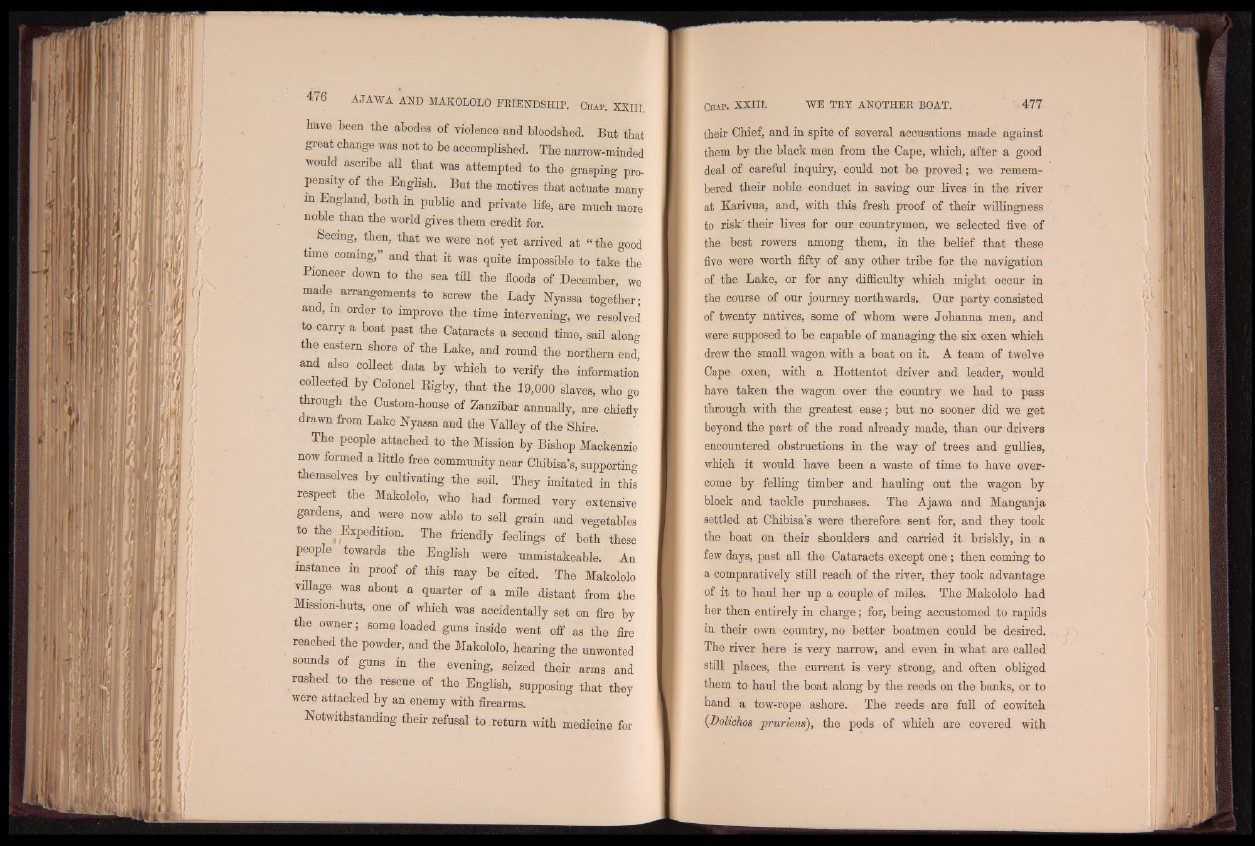
have been the abodes of violence'and bloodshed. But that
great change was not to be accomplished. The narrow-minded
would ascribe all that was attempted to the grasping propensity
of the English. But the motives that actuate many
m England, both in public and private life, are much more
noble than the world gives them credit for.
Seeing,^ then, that we were not yet arrived at “ the good
time coming,” and that it was quite impossible to take the
Pioneer down to the sea till the floods of December, we
made arrangements to screw the Lady Nyassa together;
and, m order to improve the time intervening, we resolved
to carry a boat past the Cataracts a second time, sail along
the eastern shore of the Lake, and round the northern end,
and also collect data by which to verify the information
collected by Colonel Rigby, that the 19,000 slaves, who go
through the Custom-house of Zanzibar annually, are chiefly
drawn from Lake Nyassa and the Yalley of the Shire.
The people attached to the Mission by Bishop Mackenzie
now formed a little free community near Chibisa’s, supporting
themselves by cultivating the soil. They imitated in this
respect the Makololo, who had formed very extensive
gardens, and were now able to sell grain and vegetables
o the ^Expedition. The friendly feelings of both these
people towards the English were unmistakeable. An
instance in proof of this may be cited. The Makololo
village was about a quarter of a mile distant from the
Mission-huts, one of which was accidentally set on fire by
the owner; some loaded guns inside went off as the fire
reached the powder, and the Makololo, hearing the unwonted
sounds of guns in the evening, seized their arms and
rushed to the rescue of the English,, supposing that they
were attacked by an enemy with firearms.
Notwithstanding their refusal to . return with medicine for
their Chief, and in spite of several accusations made against
them by the black men from the Cape, which, after a good
deal of careful inquiry, could not be proved ; we remembered
their noble eonduct in saving our lives in the river
at Karivua, and, with this fresh proof of their willingness
to risk'their lives for our countrymen, we selected five of
the best rowers among them, in the belief that these
five were worth fifty of any other tribe for the navigation
of the Lake, or for any difficulty which might occur in
the course of our journey northwards. Our party consisted
of twenty natives, some of whom were Johanna men, and
were supposed to be capable of managing; the six oxen which
drew the small wagon with a boat on it. A team of twelve
Gape oxen, with a Hottentot driver and leader, would
have taken the wagon over the country we had to pass
through with the greatest ease; but no sooner did we get
beyond the part of the road already made* than our drivers
encountered obstructions in the way of trees and gullies,
which it would have been a waste of time to have overcome
by felling timber and hauling out the wagon by
block and tackle purchases. The Ajawa and Manganja
settled at Chibisa’s were therefore sent for, and they took
the boat on their shoulders and carried it briskly, in a
few days, past all the Cataracts except one; then coming to
a comparatively still reach of the river, they took advantage
pf it to haul her up a couple of miles. The Makololo had
her then entirely in charge; for, being accustomed to rapids
m their own country, no better boatmen could be desired.
The river here is very narrow, and even in what are called
still places, the current is very strong, and often obliged
them to haul the boat along by the reeds on the banks, or to
hand a tow-rope ashore. The reeds are full of co witch
(Dolichos pruriens), the pods of which are covered with